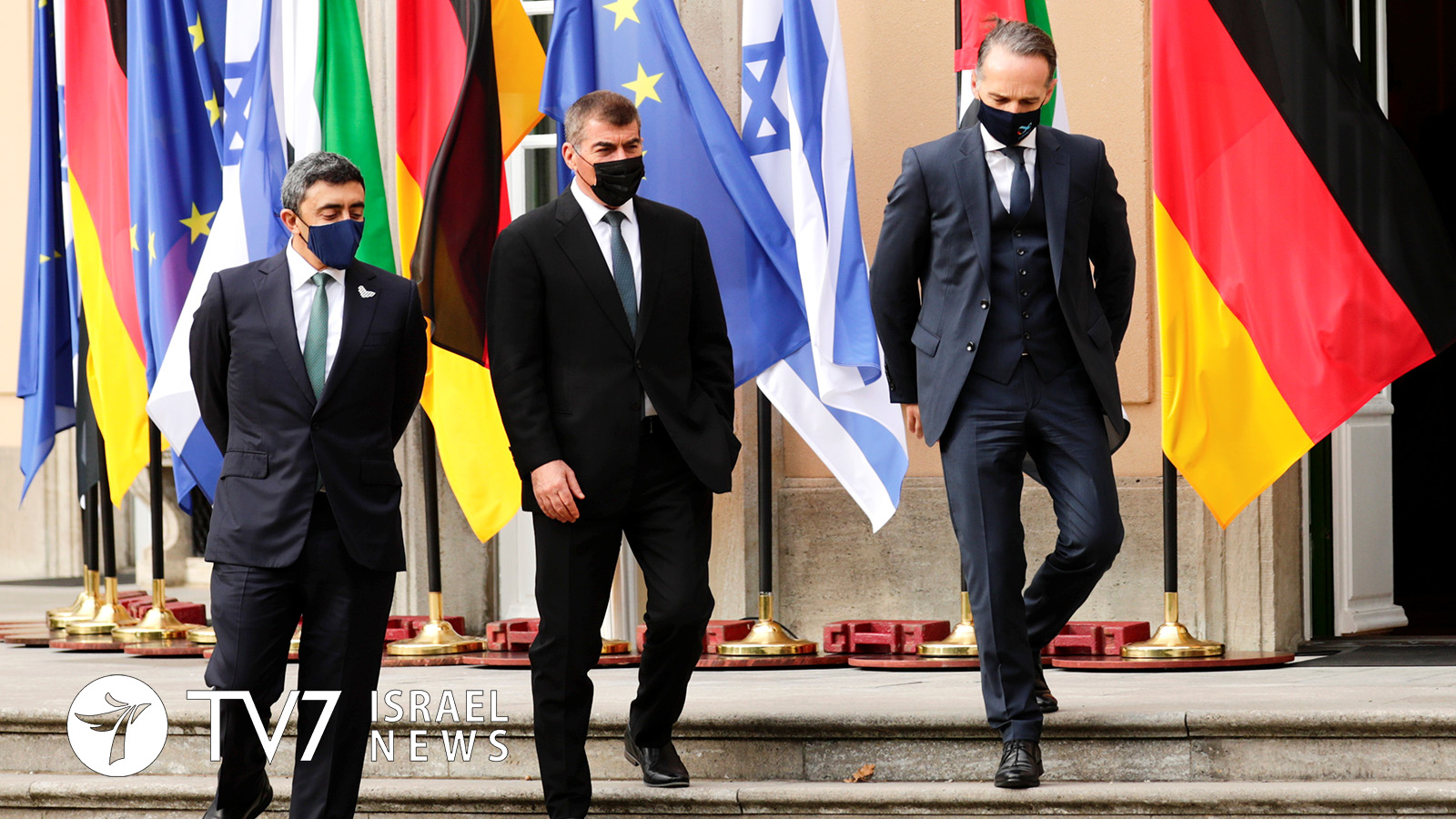Israeli Foreign Minister Gabi Ashkenazi and United Arab Emirates Foreign Minister Sheikh Abdullah bin Zayed Al Nahyan held their first historic face-to face meeting in Germany. The two met together with their counterpart from Germany Heiko Maas at Berlin’s Holocaust memorial, in a vivid display of warm reconciliation and mutual tolerance as a driver of the establishment of full diplomatic relations. It was reportedly the UAE foreign minister’s idea to visit the site alongside Ashkenazi.
Ashkenazi wrote in the memorial’s visitor’s book that the top-tier diplomatic meeting “symbolizes the beginning of a new era. An era of peace between peoples. Our joint signature in the book of remembrance is like a shared cry and oath: to remember and not to forget, to be strong and to promise ‘never again.’”
In his handwritten message commemorating the six million “European Jewish victims of the Holocaust,” Nahyan wrote, “A whole group of humanity fell victim to those calling for extremism and hatred.” He added, “I salute the souls of those who fell victim to the Holocaust” along with the words, “Never again” in both English and in Arabic. The UAE envoy then cited a Jewish prayer translated into Arabic: “May their souls be bound up in the binds of life.”
Nahyan said that the visit “underscored the importance of human values such as coexistence, tolerance and accepting the other… as well as respect for all creeds and faiths. These are the values upon which my country was founded.”
He seemed particularly moved when informed by German Foreign Minister Maas that Ashkenazi was the son of Holocaust survivors. According to the Israeli Foreign Ministry, “the Emirati minister was surprised to hear this and asked to hear more,” so “Minister Ashkenazi told him of his roots and his father who survived a labor camp in Bulgaria in 1944 and about his immigration to Israel.”
Maas said it was “a great honor” that his colleagues chose Berlin as the location of their first meeting, as “the most important currency in diplomacy is trust and I am personally thankful to both my colleagues that they are placing this trust in Germany.” He also said their willingness to meet in Berlin and tour the Holocaust memorial together “shows how serious you are in your efforts for good bilateral relations,” and that “peaceful coexistence in the Middle East is possible.”
Following the talks, Israeli Minister Ashkenazi said at a joint press conference that tourism and trade topped the agenda in a discussion he described as “good.” The next hoped-for meeting would center security, he said, as “everyone understands why we need to be strong to avoid war and create peace.” Ashkenazi praised the UAE for opening the door to normalized relations with other Gulf Arab states, but said those countries must be as “courageous.” After calling for the resumption of negotiations with the Palestinians, the top Israeli diplomat and former IDF Chief of Staff concluded his remarks in Arabic expressing hope for peace.
Minister Nahyan said the two also discussed cooperation in the energy field. In remarks about the Palestinians, whose dispute with Israel had formerly served as a barrier to Arab relations with Jerusalem, Nahyan said there is “new hope for Palestinians and Israelis so they can work for a two-state solution and a better region.” He underscored that his nation, Israel and Germany are all working toward the advancement of greater stability in the Middle East.
Minister Maas called the agreement between Israel and the UAE “the first good news in the Middle East for a long time — and a chance for new movement in the dialogue between Israelis and Palestinians.”
The U.S.-brokered the establishment of full diplomatic relations between Israel, the UAE and Bahrain on 15 September; over not just hopes of greater regional stability and future collaborations but also rooted in shared concerns over Iran.
Meanwhile business partnerships between Israel and the UAE are surging.
The Abu Dhabi Investment Office and Israel Export Institute have just signed an agreement to boost trade opportunities, and the Jerusalem-based Israeli venture investment firm OurCrowd signed a memorandum of understanding with the Phoenix business development company to increase business and technology ties between the two countries.
OurCrowd, which has $1.5 billion of committed funding, will support UAE-based startups seeking growth and development in Israel as well as those seeking to collaborate on innovation.
Phoenix will serve as an investment platform for Gulf businesses wishing to invest in Israeli technology, while also increasing investment in Gulf-based startups it will connect with OurCrowd through the Israeli firm’s crowdfunding platform. Israeli startups will also be introduced by Phoenix to potential partners in the Gulf region.
